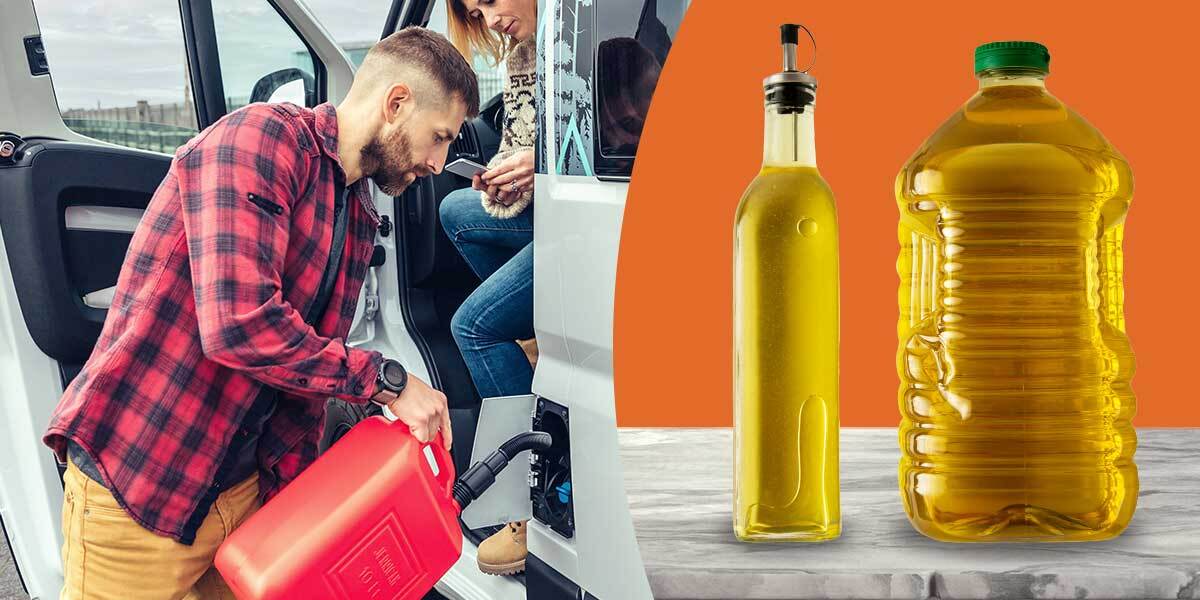Give your vegetable oil, olive oil, and more a second life… to save your life.
The cooking oils in your kitchen will last anywhere from a few months to a couple years before they’re considered “rancid.”
But that doesn’t mean they’re useless.
Bad Cooking Oil Isn’t Dangerous Like Other Rotten Foods
Unless you put it in your body, expired cooking oil will not hurt you. There’s no water in it, so it can’t grow mold or go rotten.
What it will do is start to smell stale—a little like wet socks—which is why we recommend storing it outdoors, in a shed or barn.
10 Surprising Emergency Uses for Expired Cooking Oil
Here are the top 10 uses for expired cooking oil that are sure to come in handy during an emergency:
1. RUST PROOF SURVIVAL GEAR

Unlike other substances, the molecules in oil cannot be dissolved by water—the two bounce right off of each other. It’s why cooking oil makes a great temporary coating to keep metal from rusting.
2. REMOVE RUST
In the same way cooking oil protects from rust, it can also remove it… but you’ve got to use the right oil for the job.
A good penetrating oil, like linseed, is best for cleaning steel. For cast iron, use vegetable oil.
If you find yourself in an evacuation or bug-out scenario, coating any exposed metal in a little oil will help repel water. It may also make a mess… but better that than rust!
3. MAKE EMERGENCY FUEL (BIODIESEL)

It might blow you away to know that the cooking oil you’ve been tossing out all these years is strong enough to POWER A DIESEL ENGINE!
It’s called “biofuel” and it can save you in an emergency.
Before you go pouring vegetable oil into your engine, though, there are a few things you need to know:
- Biodiesel use is highly regulated by the government, so it may be illegal in your state to run your car on cooking oil.
- Your diesel engine is not optimized to run on cooking oil, so don’t rely on it for long periods of time.
- Never dump raw vegetable oil into your fuel tank—that’s a one-way ticket to destroying your engine. Cooking oil needs to be properly treated and applied, but with a little know-how, you can do it on your own.
In other words, homemade biodiesel is for emergency use only!
4. LUBRICATE A CHAINSAW

Old vegetable or canola oil makes a very serviceable chainsaw lubricant. According to the United States Department of Agriculture Forest Service, “Vegetable oils have many good natural properties including good lubricity, good resistance to shear, a high flash point, and a high viscosity index.”
As with other applications, vegetable-based oils do have some drawbacks as lubricants. Most notably, their oxidation stability makes them a poor choice in cold weather conditions. In that case, you’re better off with petroleum lubricants.
5. LUBRICATE SQUEAKY JOINTS
Cooking oils make a great backup lubricant for squeaky parts and hinges. They not only keep things running in tip-top condition during an emergency, but can help you maintain a low profile, too.
Most oils do a good job of cutting down friction, but coconut oil, canola oil, vegetable oil, and olive oil are particularly effective.
6. PROTECT GARDENING TOOLS

Oil protects wood a lot like it protects metal. It forms a barrier that repels water and keeps wood from rotting. If gardening is a big part of your preps, cooking oil is an effective sealant for your gardening tools.
Coconut and walnut oil are especially effective for coating wooden handles—but keep in mind that they won’t penetrate polish or paint.
7. CREATE LIGHT
Again, we don’t recommend it as your go-to emergency light (there are better options for that), but as a backup, you could do worse than a cooking-oil lamp.
With just a third a cup of old cooking oil in a jar, some salt, and a cotton ball, you can keep a room illuminated while you search for better lighting devices.
8. KEEP PESTS AWAY
Sheltering in place is hard enough—the last thing you want to deal with is insects on top of everything else.
Unfortunately, there’s nothing like a big storm or wildfire to drive pests toward your property.
If you don’t have bug spray on hand, you can always count on old cooking oil to ward off pests. It’s shockingly effective. Just mix a tablespoon of mild dish soap and a teaspoon of vegetable oil into one quart of water and voila! You’ve got bug spray you can count on.
The oil works by coating the exoskeleton of the bug and blocking its “spiracles”: the openings that many insects use to breathe. Essentially, an oil-coated bug suffocates.
9. SUPPRESS DUST

If dust is kicking up around your property after a natural disaster, pouring cooking oil over the dirt will immediately solve the problem.
The oil penetrates about an inch down and causes soil to harden as people walk or drive over it.
Be careful where you use it though. Oil can suffocate the roots of plants the same way it does bugs.
10. CONTROL MOSQUITOS IN OUTDOOR WATER
Standing water is a big hazard after most major storms—it creates a breeding ground for mosquitoes. To stop them in their tracks, pour about one-quarter teaspoon of vegetable oil per gallon of water into every puddle where mosquitoes are breeding.
Get your neighbors to do it too and you’ll see a quick, dramatic drop in the mosquito population around your home!


8 comments
Emergency Essentials
JP and AppyHorsey, to the question regarding the purpose of the salt in a homemade oil candle, check out this tutorial by ThriftyFun: https://www.thriftyfun.com/Making-a-Cooking-Oil-Candle.html
Cheryl
Oil, salt and cotton ball to make light? Wish you would explain that one better. I have heard of a shoelace or candle wick inserted into a jar of old oil to burn like a kerosene lamp. Just don’t understand the cotton ball and alt bit/
JP
How does one make a light with oil, salt, and a cotton ball?
Jerry Dean Bobbitt
very help full information. thank you
James LoBretto
Great information, thank you very much
byrd
Thanks for the information. I will try some of these uses for old or used cooking oil, veg. oil.
AppyHorsey
What’s the salt for in #7? Please explain. Thanks.
Great article. Now I know what to do with all the old/stale cooking oil I have setting around in different places.
OH!! And do NOT do #10 in “deep” puddles if you have ducks or geese!!!! I once drowned a young (almost half grown) Goose in an old tire that I had setting upright and put cooking oil in the water in it (filled up with water every time it rained). I guess the little goose got into the tire and the oil slicked it down to where it couldn’t do anything.
Leslie Price
I wonder about the oil in puddles… wouldn’t that be a hazard to birds and small animals to drink or bathe in?